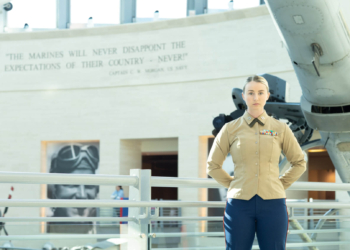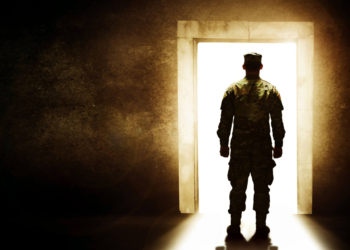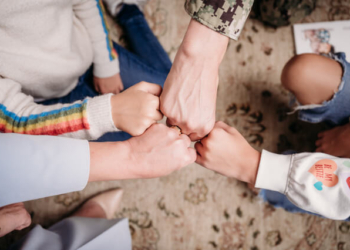When faced with a trying overseas assignment, some military spouses on Guam have stepped outside their comfort zones to find a stronger sense of self through hiking.
Mallory Moffit is one of those people. When faced with a surprise pregnancy in a place 13,000 miles away from her friends and family with a husband deployed, she eventually found courage and fearlessness whilst standing on top of the tallest peak in the world, Mount LamLam, while breastfeeding her newborn son.
“It was great because it gave me a little bit of a confidence boost after when we got to the top,” she said. “And it was just really gratifying to get up there and bring him along. He’s kind of part of my Guam journey.”
That hike was most symbolic to Moffit because she was able to bring her son along, who represented a lot of challenges she overcame, and completed it with a group of supportive people who became her extended family.
“I couldn’t have done that first year without the community,” she said. “With the amount of encouragement, help, and support that everybody gave throughout the whole year, it seemed only right to be up there with everybody.”

Becca Pretzinger, another woman who embraces Guam’s hiking culture, also recognized how the experience can bring people together. Her move to Guam came with its own sacrifice of leaving behind close family, like a niece she still has yet to meet, but the intimacy hiking created with people helped make the separation easier. Even moreso, she liked how hiking helped build her character.
“Before coming to Guam, I hiked, but not religiously,” she said. “After a year of living on Guam, I have people that will blindly follow me into the jungle and trust that I will get them out. So for me, it has been this amazing experience to show me what I am capable of doing.”
Pretzinger shared how hiking on Guam is unique because there are not well-marked trails. Getting from one point to another means being familiar with simple landmarks, like a specific-looking tree, and relying on the change of the ecosystem for direction. Sometimes getting lost is part of the game, but it is something Pretzinger wouldn’t change.
“I am happiest when I’m hiking,” she said. “No matter what kind of day I’ve had.”
Melanie de Jong is also familiar with Guam’s one-of-a-kind terrain, and how it brings people together. She also left friends, family, beloved animals, and a home behind, but Guam became one of her favorite duty stations because of the adventures it provided.
“Hiking in Guam was my saving grace,” she said.
De Jong also pointed out that she was in the best shape of her life during her tenure on Guam, largely in part to how physically challenging some hikes could be. As she pushed herself to do things she wouldn’t otherwise do, she became more fit and found camaraderie in the experiences.
In the end, she said, “Guam made me more adventurous.”
For people struggling with a new duty station, Moffit urged people to find whatever the new area has to offer, and make the best of it.
“Jumping right in and seeing what a place has to offer, it helps you make it feel more at home because you create those memories quickly,” she said. “I think Guam would be a really difficult place to live in if you didn’t get out and do stuff.”
Pretzinger’s advice echoed some of the same sentiments. “No matter how hard it is and how you feel, you’re always going to feel better getting out and doing something even if it’s not the easy path. It’s how you make friends. It’s how you make experiences.”
Read comments






































